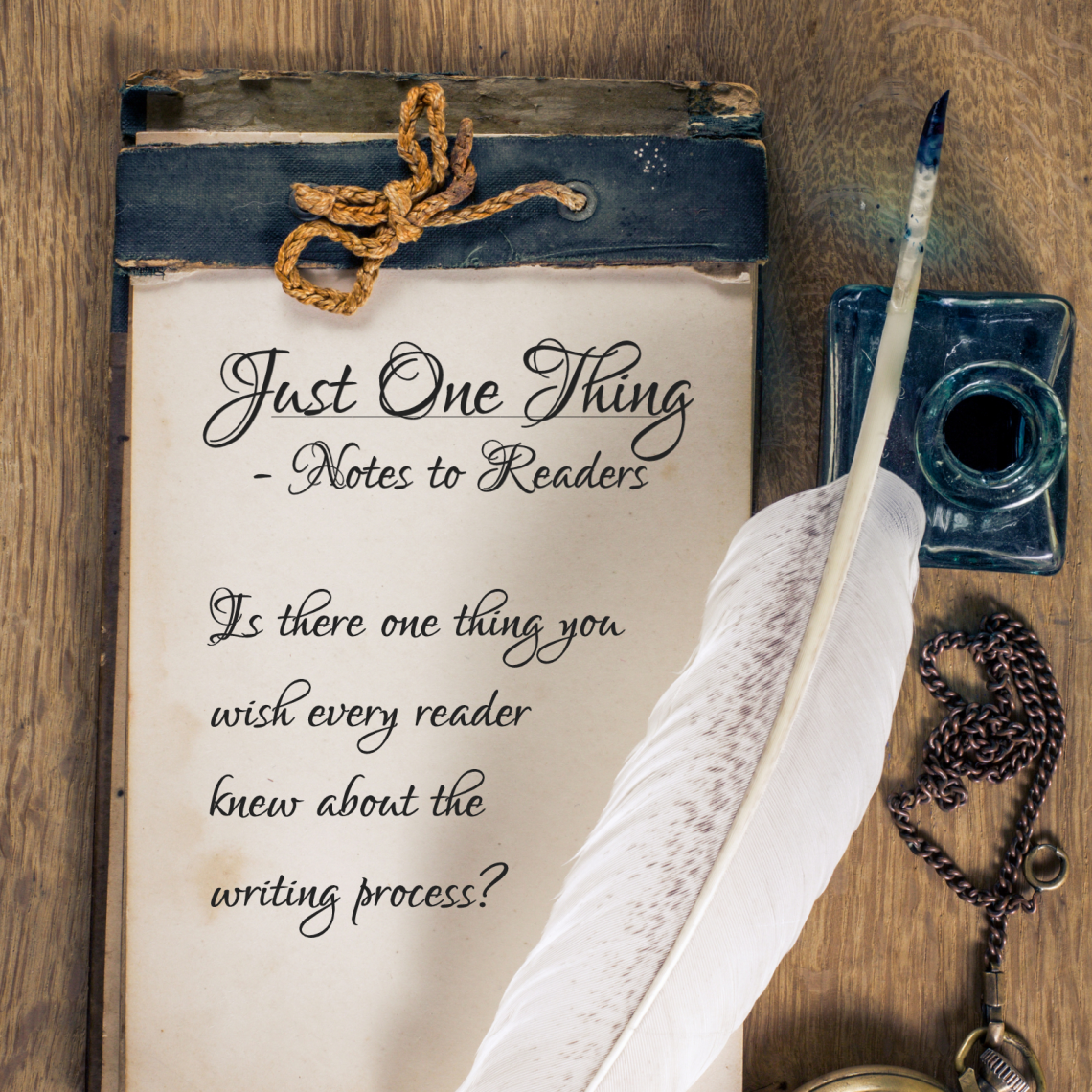
Notes to Readers: Just One Thing
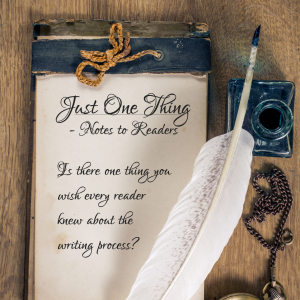
I interact daily with a lot of writers all around the world. And like any other career, we talk shop. We geek out over grammar and prose, over how to choose the right title or book cover, how to find resources, how to develop unforgettable characters, and how to write a jaw dropping plot twist.
But like any other career, writers also bemoan (do writers bemoan? Yes, sadly, we do) misunderstandings in our chosen discipline. Things people on the receiving end of our art think they know about what we do and how we go about doing what we do.
So I asked my writer friends to help me with a new blog series by writing notes to you, the readers. And this is how I approached them:
You sit down at your computer, pick up a pen and notebook, and write. The words flow, and after a while a novel emerges. Right? Isn’t that how it works?
Wait, it doesn’t?
Authors know there is much more to this writing lark than just putting words on paper. The process is different for every author, and the publishing industry is tough on the best of days. Whether you are traditionally published or indie published, what do you wish every reader knew about the writing process?
Here are some of the responses I received. These are notes to you, readers, from authors everywhere.
Is there one thing you wish every reader knew about the writing process?
A note to my dear readers: I wish you knew how much love goes into every line I write and about the nights spent in half-slumber thinking about the scenes that would be written the next day. Sometimes, I can’t sleep until I am sure of where the story is going next, or I send myself email in the middle of the night to remind myself of a line I don’t want to forget. I think if I lived alone, I would jump out of bed in the middle of the night to write, but, for now, I wait until the care and keeping of children and husband are complete in the morning.
When I do sit down to write, it is tempting to include footnotes, sometimes to add in a fun historical tidbit that doesn’t quite work in the story, but other times to share which passages caused tears to fall as I wrote them or which ones were inspired by certain places I visited.
I wish we could talk about our favorite scenes and the history behind them, and I could admit which parts are entirely figments of my imagination. You could share what you loved and what you think I could have done better if I weren’t rushing on to a scene I preferred.
If only you knew how much it means to me when you to share my book with your friends because it had touched your heart so much that you can’t keep it to yourself, because that, dear reader, is precisely why I have shared it with you.
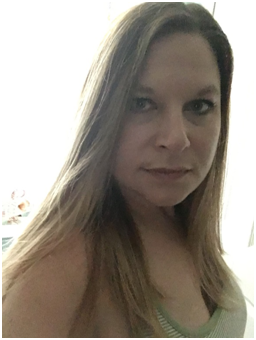
Writer of historical fiction and sufferer of wanderlust, Samantha Wilcoxson strives to reveal the deep emotions and motivations of historical figures, enabling readers to connect with them in a unique way. Her latest novel, Luminous, celebrates the lives of the ‘radium girls’ of Ottawa, Illinois. She is currently working on Women of the American Revolution, coming from Pen & Sword, in September 2022, and But One Life: The Story of Nathan Hale, available June 2022.
Readers, hear this. You’ve been lied to. You know that narrative of the author you’ve inherited from movies and TV? The one of the writer banging away at her typewriter or computer in a fevered state. The one that when she’s done, she writes ‘the end’, puts the final page on the manuscript pile, and sends it off to her editor.
It’s a lie.
If only it were that easy! Writing actually happens in stages and with many, many drafts. How many depends on the writer, but it is most certainly not one. Sometimes a novel or story requires so many passes, the writer weeps at the thought of having to read it over one more time. Weeps!
But fear not, there is hope. This revision process can be quite fun, like solving a puzzle. For some authors, it is the best part. For others, the love of revision has to be learned, because if we don’t, we’ll never finish a book. Either way, revision is where the plot and characters all finally come together into something that resembles a story that people want to read. But it is hard to take all the different threads and weave them together to create a seamless novel.
That being said, I have one final thing to add: despite the challenges, writing is magical. There is nothing better than when a character walks out of our subconscious and strides into our story. Or when a tricky plot twist presents itself and we cackle with a ‘mua-ha-ha-ha’ like evil masterminds.
It is the magic that makes up for the difficulty of writing. Like all of life, it is the balance of challenge and magic that makes it all, every minute of hand wringing and banging our heads on our desks, worth it.
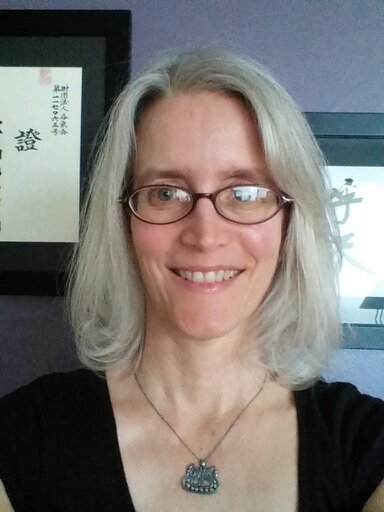
K.S. Barton writes historical fiction stories of love and adventure set in the Viking age. The author of three novels, she explores themes of family, honor, and strength all within the backdrop of Norse society. Visit www.ksbarton.com for more details and where you can claim a free prequel to the Norse Family Saga series.
It’s an adventure being an author! One of the biggest benefits of being a teacher are the holidays, so I challenge myself to get a book drafted in each one. My obsessive nature drives me to write all hours of the day to get it finished. At these times, my characters become entirely real to me. I’ve been known to try and remember who told me something, only to discover on re-reading it was one of my characters!
The first drafts are always garbled, so then comes the inevitable (and very much hated!) redrafting. I don’t edit my own work. I know it too well, I’d never be able to edit properly. But I’m fortunate to co-own our family-run publishers, so all editing and publishing is done there!
Because my books are in-part me, it’s always a bit (there’s an understatement!) frightening putting them out there. You know those dreams where you go to work and then discover you’re not properly dressed? It’s like that on steroids, because it’s your soul you pour into those pages! Opening this to complete strangers means throwing open not only your books but also yourself to all sorts of criticism. It’s almost masochistic!
So why bother doing it? Because every now and then you find someone who loves your books and your characters as much as you do yourself. I put my author email into all of my books, hoping for feedback. When I get that feedback, all the days, weeks, and months of painstaking writing, redrafting, editing, and publishing, become worth the time. I don’t write for money, I write to share the adventures which take place in my imagination and are translated through my text.
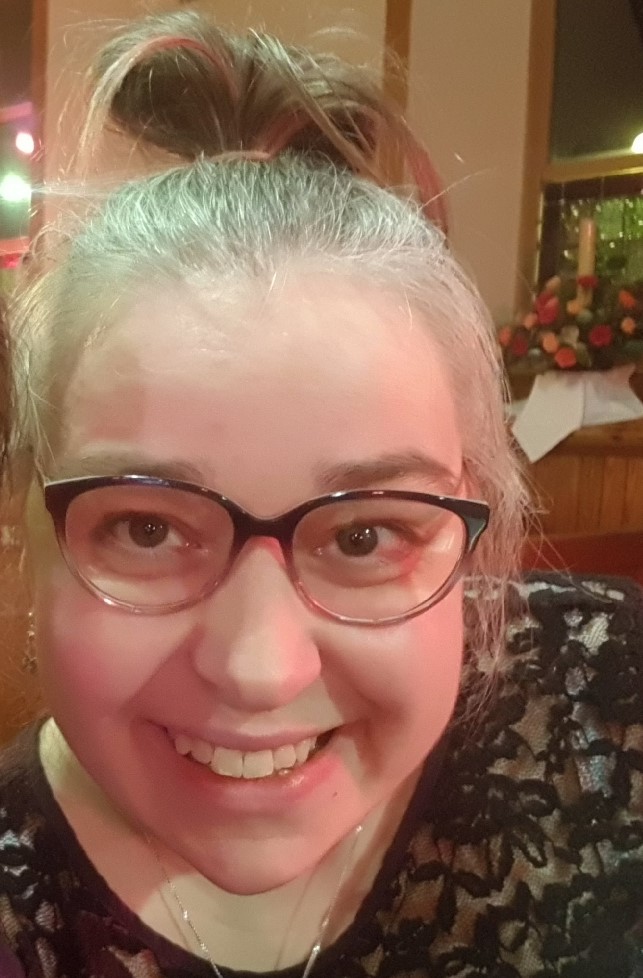
No bright lights, no massive paycheques, but living a dozen lives every day. Adventure!
Virginia Crow lives in a far-flung corner of Scotland. She writes historical fiction and fantasy, sometimes combining the two. Sheenjoys swashbucklers like The Three Musketeers, and is still waiting for a screen adaption which lives up to the book! When not writing, Virginia is usually teaching music. www.stompermcewan.com
While this is not true for all writers, of course, the need to move to get the creative juices flowing is something I’d guess readers don’t envision. Writers sit at desks and write – isn’t that how it works? Not for me.
Walking is my absolute best way to let my subconscious kick out plot, dialogue, or motivation of characters. (The second best is to take a shower. I would love a waterproof notebook or board and a waterproof pen to jot down notes soaking wet!) When I walk, I have my phone, and I make notes, either stopping to type them in, or, more likely these days, record them by voice. I’m in good company here: Wordsworth walked and composed verse; Darwin walked and solved problems related to evolution and science.
Walking, apparently, creates a mental state known as “transient hypofrontality”: induced by exercise that doesn’t need concentration or thought. Sensory and motor brain regulation is heightened, and general concepts and rules pushed to the back, according to Dr. Damon Young, writing in Psychology Today. The parts of the brain that coordinate general concepts and rules are turned down, while the motor and sensory parts are turned up. Impressions and ideas blend, allowing connections and creative solutions to ‘bubble up’ from our subconscious. (This probably explains creativity in the shower, too: they are very sensory experiences, but don’t need concentration. Unless the hot water suddenly stops.)

Knowing this tells me why I find it harder to write in a Canadian winter: at my age, I have to be careful of icy sidewalks and bitter cold, and walking isn’t something I can do every day. The exercise bike just doesn’t have the same effect!
Marian L Thorpe’s books are historical fiction of an imagined world, one that resembles Britain, Northern Europe, and Rome. A world where a society evolved differently after the Eastern Empire left, where one young fisherwoman answers her leader’s call to defend her country, beginning a journey into uncharted territory.
I bought a 24 x 36 poster from a reputable website, had it framed, and hung it on my writing office wall. So what you may ask? The importance of this poster cannot be overstated because it influences how I see the world in which I’m writing and how a reader will see it too.
Writing a novel is a lonely business. Writers cloister themselves away from the outside world and move their perspective to what’s happening inside their hearts and minds. Yet the story we’re writing has to feel physical as well, like someone caressing your hand or kissing your cheek; a loving touch that stimulates our corporeal world even if we’re writing high fantasy where worlds are pure imagination. There must be something seen else the reader will not see it either.
I write historical fantasy and fiction. A good majority of my characters are real historical figures and the world they live in existed at one time. It’s sometimes difficult to discern who they were and convey it properly. Therefore, I have to grasp it. That poster I mentioned is a painting of one of the most trusted and capable major generals of the American Revolution: Nathanael Greene. I’ve written about him as part of a series, but now I’m writing a novel specifically about him. I want to feel his presence, see his face, and blow kisses at him when I sit down to write. Nathanael’s is not the first poster I’ve purchased that enabled me to see the world I’m writing. I have a others who are still on my wall although I’ve moved on from them as a main character.
If I can share my love of my characters as deeply as I feel, then I have succeeded.
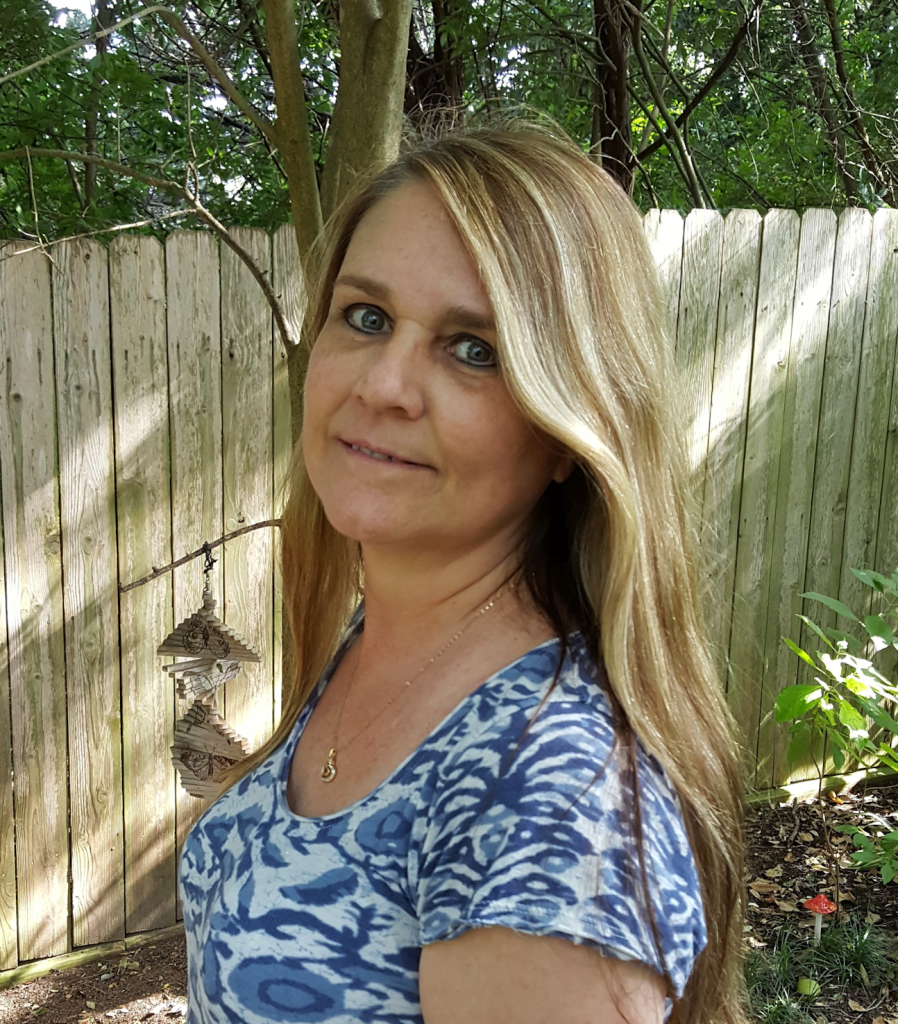
Salina B Baker is an avid student of Colonial America and the American Revolution. She’s a published author with several historical fantasy works including a series. Her lifelong passion for history and all things supernatural led her to write historical fantasy. Reading, traveling, and graveyard prowling keeps that passion alive.
I don’t think readers understand how important reviews are. Other than verbally recommending a book, the second most effective way of ‘getting the word out’ is through reviews, and whether you’re traditionally published or self-pubbed, it is the single most important wide-range marketing factor for authors. Basically, reviews equal sales. I once read that only 1 out of every 200 readers of historical fiction writes a review. Many readers think either the process is intimidating–too many buttons to navigate through or they’re not confident in their own writing or assessment of the work to post their opinion. Others think it takes too much time. Perhaps they’re intimidated by the long, verbose reviews some readers leave and think they’re expected to do the same. What they don’t realize is that most people don’t read the long reviews and gravitate towards the ones that contain only a sentence or two.
The other thing authors would like readers to know is that giving a 1 star review for a book that arrived later than promised or with a crease in its cover or some other reason that has nothing to do with the content of the book, only hurts the author. The author has nothing to do with how the retailer produces or ships the product. Complaints about such things should be made directly to the retailer.
Since authors aren’t allowed to ‘require’ a review for a free copy of their books, we have to sit back, cross our fingers, and hope the reader feels strongly enough about our work to share their thoughts on it–good, bad, or indifferent. It’s all a gamble. There’s a lovely quote I like to refer to in my social media posts: “The best way to thank an author is to write a review.”
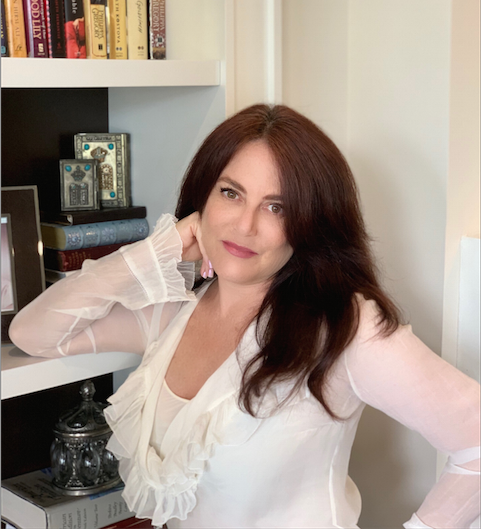
Donna Scott is an award-winning author of 17th and 18th century historical fiction. Before embarking on a writing career, she spent her time in the world of academia. She earned her BA in English from the University of Miami and her MS and EdD (ABD) from Florida International University.




2 Comments
Anne M. beggs
I just love this, thank you for taking the time to share your thoughts and other writer’s feelings on the inner lives of authors. I will be sharing the insights…and it’s Word Dancing and Writer Wednesday…how timely =—->
Stephanie
Glad you enjoyed it, Anne! Thanks for taking the time to read. And I love that you plan to share it. I hope more people find something interesting about the writing process!